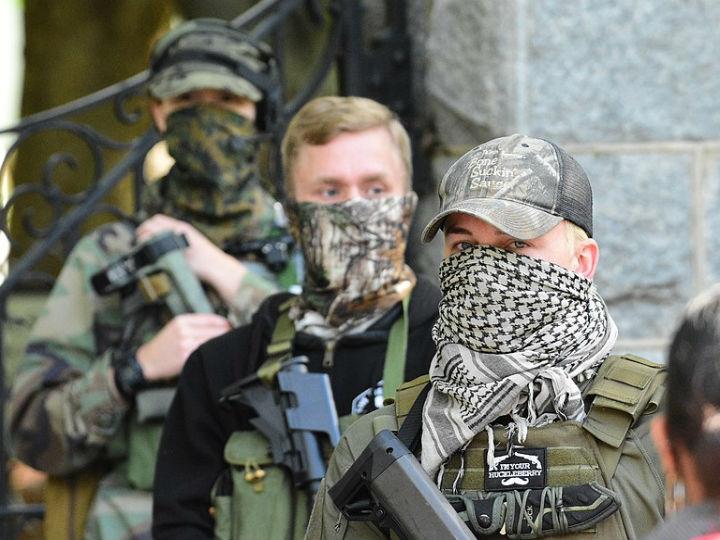by Alexandra Brzozowski
Global deaths from terrorism have fallen for a fifth consecutive year, according to the 2020 Global Terrorism Index, but far-right attacks have increased by 250% globally, to a level not seen in the last 50 years, with the pandemic likely to exacerbate the trend.
Deaths from terrorism fell by 15% around the world last year to under 14,000, a 59% decrease since 2014, according to the report issued by the Institute of Economics and Peace (IEP) on Wednesday (25 November).
It summarises global trends in terrorism and ranks countries in order of those most affected in terms of both casualties and economic costs in 2019.
The MENA region (Middle East and North Africa) recorded the largest regional improvement in terrorism for the second consecutive year, recording the lowest number of deaths since 2003, with this year’s pandemic likely to extend the trend.
The decrease was partly due to the collapse of Islamic State territories and the subsequent de-escalation of conflicts in the Middle East.
However, the number of far-right terrorist acts has risen by 250% since 2014. When it comes to fatalities, the increase was even more than 700% within five years, with 89 people killed in 2019.
There are now more right-wing attacks than at any other time in the past 50 years, with 13 far-right terrorist attacks that had each killed more than 10 people, compared to 24 Islamist attacks, and three linked to other ideologies, the report found.
“As a new decade begins, we see new terrorist threats. The rise in right-wing extremism in the West and the deterioration in the Sahel are prime examples,” said the Institute’s Executive Director Steve Killelea.
“As we enter a new decade we are seeing new threats of terrorism emerge. The rise of the far-right in the West and the deteriorations in the Sahel are prime examples,” he said.
“Additionally, as seen in the recent attacks in France and Austria, many smaller groups sympathetic to ISIL philosophies are still active,” Killea added.
According to Thomas Morgan, a senior research fellow at IEP, there was often a “misconception” that terrorism predominantly occurs in Western nations.
“There is a misconception based in the coverage levels in the media … but also because 96% of terrorism occurred in the context of an ongoing conflict,” he said, referring to Afghanistan, Syria, Nigeria, Somalia or Yemen.
Pandemic could increase instability
Morgan also said he feared the economic fallout from the COVID-19 pandemic could have an impact on both the level and the types of terrorism that would happen in the coming years.
Although curfews, closed borders and grounded airline fleets have made it harder for terrorists to move around, recruit new foot soldiers and commit atrocities, the resilience of many highly developed Western societies has declined in recent years, the study authors warned.
According to the report, the pandemic could exacerbate this trend and, because of the uncertain economic outlook, lead to even more political instability.
“We might see less funding for counter-terrorism activities or activities that would create a better socio-economic environment in which people would have less tendency to be radicalised,” Serge Stroobants, director of operations for Europe, the Middle East and North Africa at IEP, told EURACTIV.
“But under this socio-economic pressure we might see that more people are going to alienate from society, more people feel discriminated against and more people would be prone to listen to the messages of [terrorist] recruiters,” he said, adding: “That’s a potential risk for the future.”
Counter-measures for online terrorist content
“To break these influences three major initiatives are needed – to break their media coverage and online social networks, disrupt their funding and lessen the number of sympathisers,” Killea warned.
Asked what is needed to counter terrorist tendencies, Stroobants said:
“There is a need to review the way in which societies are are built, and need to make sure that less people get into to that level of frustration, that level of alienation.”
In a paper published as part of the annual Global Terrorism Index report, researcher Milo Comerford said one pro-Islamic State (IS) network on Facebook used “a web of several hundred accounts” to “expand” spreading propaganda between April and July.
It used tactics to avoid the content being removed, including hiding it by starting videos with legitimate news footage before moving to extremist material
According to his research, COVID-related hashtags were used on Islamist messaging to draw in unsuspecting users, and one anti-vaccine Facebook page with thousands of followers was hijacked by IS supporters.
At the same time, one white supremacist channel added more than 6,000 users in March, while another specifically focused on COVID-19 grew from 300 users to 2,700.
EU interior ministers promised in mid-November a coordinated crackdown on Islamist extremism after last month’s attacks in Paris, Nice and Vienna, and agreed to finalize negotiations on regulations for faster removal of online terrorist content by the end of this year.
*first published in: www.euractiv.com




 By: N. Peter Kramer
By: N. Peter Kramer
